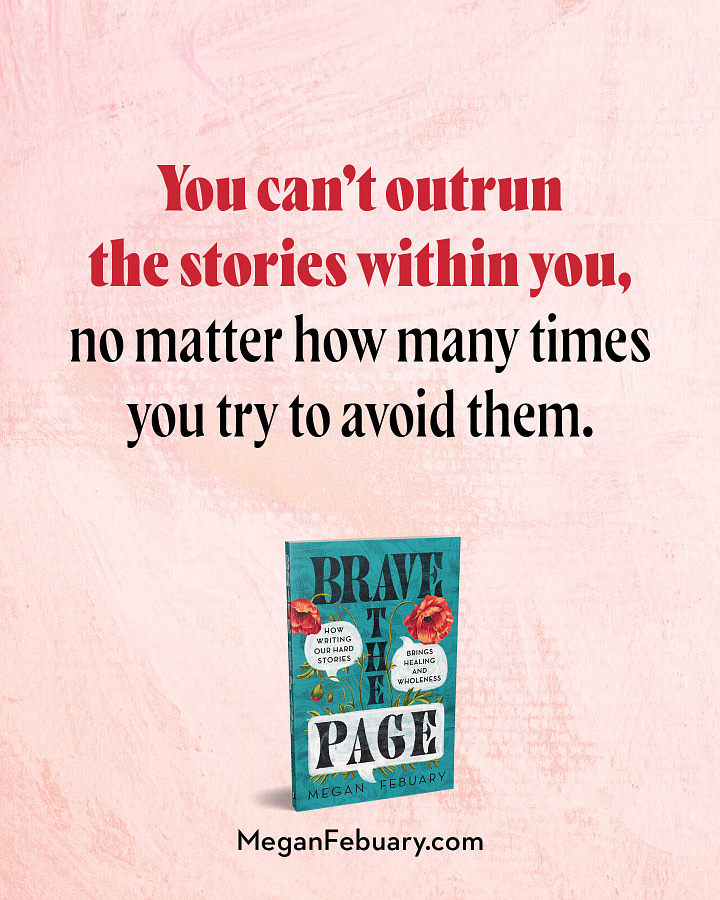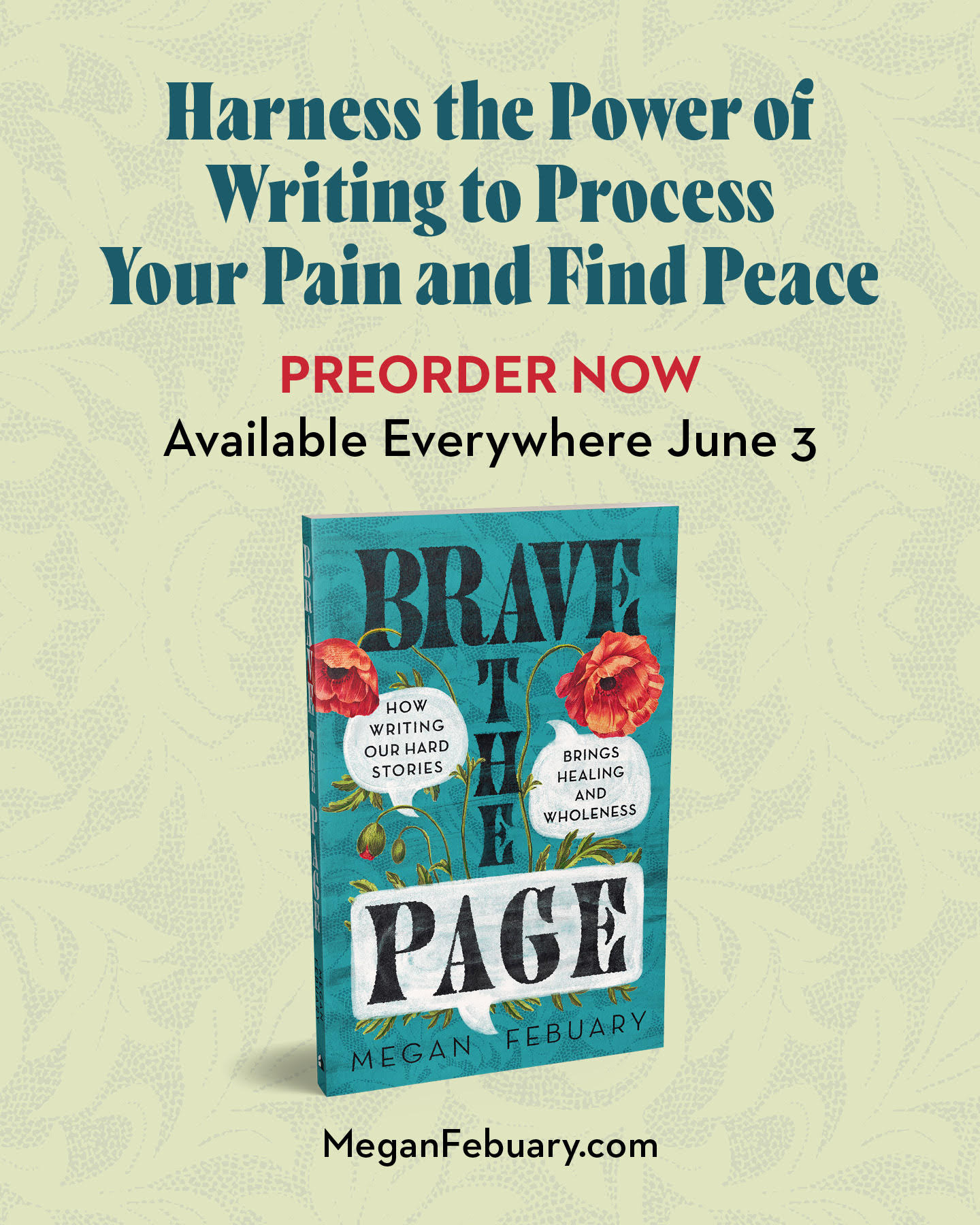Writing to Heal Your Story
A guest post from trauma-informed writing coach and author Megan Febuary
“Writing about our lives changes our lives. Not because the facts change… What changed was me. When the storyteller is transformed, the story is transformed. When you change yourself, you change your story.”
—Poet and author
on a recent episode of For the Love podcastToday’s Substack is a guest post from trauma-informed writing coach and author . Megan is the founder of the global storytelling platform and literary magazine For Women Who Roar. Called a leading expert in creative recovery, Megan received her MA from The Seattle School of Theology and Psychology, where she focused her research on the body as a storyteller.
I asked Megan to share with us about writing to process and heal religious trauma. Megan’s new book, Brave The Page: How Writing Our Hard Stories Brings Healing and Wholeness, is a memoir meets masterclass on how we can use writing and creative expression to heal past trauma and emotional pain. It is filled with writing prompts and affirmations at the end of each chapter for you to apply the text to your life.
While I haven’t finished reading Megan’s book yet, her gentle, trauma-informed approach to writing rooted in choice, safety, resilience, and embodiment felt like a perfect fit for my community. You don’t have to be a professional writer to benefit from writing as a creative exercise. As you are seeking to heal your faith from toxic beliefs, perhaps a writing practice may be part of your own healing journey.


Trauma-Informed Writing to Heal Your Story by Megan Febuary
Over the years, in my work as a spiritual guide, yoga teacher, and writing coach, every aspect of my work is painted with the primer of a trauma-informed lens. So what does this mean? It is about creating a safe, consensual, creative, empowering space for your voice.
I am excited to share with you four key categories of being a trauma-informed writer that will change the way you show up in your writing life.
The first category of trauma-informed writing is agency.
Ultimately, this word really means choice. When you think about having agency in regards to your writing, the question really is what it means to have choice in your writing process? I work with so many clients writing their books, and they will suddenly say that they feel ‘stuck’ or ‘paralyzed.’ What does this sound like to you—a trauma response, right?
This ‘fight, flight, freeze’ effect shows up in our writing and creates a similar response in our body to what we’ve experienced in past trauma. Often, this happens for writers because they feel they have lost their choice and agency in their writing. Maybe this is due to the pressure of what others expect them to write, or the time frame in which their work is too fast. There are a million reasons why you may be triggered in your writing, but at the core of where it stems from is whether you have creative consent. Remember, you get to make the rules here; you are allowed to change your mind, and you have a choice in your writing process.
The second category of trauma-informed writing is safety.
This is essential, especially when writing about past pain. One big fear that clients come to me with is the fear of sharing their truth and how that truth might impact others. I know this fear firsthand.
When I first began writing about my life, it felt like every word was breaking down a wall within me. This had profound spiritual meaning for me, like the Jericho Walls guarding my heart, finally crumbling to the ground as I marched around them and declaring my story. With these walls coming down, it meant exposure, vulnerability, and the trauma of sudden change. This was essential for my writing process, but I had to relearn a sense of safety in my creative process. It felt scary to write about my life and the stories that had deeply shaped me, mainly because I was, in some ways, still attached to the old narrative.
The work of creating safety in my writing and what I prompt in my clients reminds us that we are no longer stuck in the past but are alive, present, and safe now in this moment. Though writing about a painful past experience may usher the felt memory to the surface, the confirmation of safety by bringing the practice of embodied storytelling validates that we are no longer trapped in the old story but are able to write a new one.

The third category of trauma-informed writing is embodiment.
Consider what it means for your body to hold stories. How does it feel to know that your body has held the inarticulate language that your pen hasn’t had the capacity for?
This embodiment is really key for writing material that brings up a lot of feelings that have lived beneath the surface of our skin. What does it mean to be embodied in your writing? In short, it is about paying attention and listening. Writing from this embodied space invites us to be grounded, to write with an awareness of the past but attunement to the present, and to care for our body’s memory of the story.
The fourth category of trauma-informed writing is compassion.
I believe this is one of the most essential pieces of trauma care. Please hear this because so many folks I work with, and I struggle with these too: the perfectionism block, the imposter syndrome, and the cycle of sabotage. Why do these typically play out in our writing? Because we have shifted away from compassion in our creative process. When we can begin to trade out self-contempt for self-compassion in our writing journey, we can write more freely and with less resistance.
Considering these categories, consider what is might look like to create a trauma-informed writing practice for when you are writing tender material. Think of this as your own trauma writing survival guide.
If you want more practices like this, Brave The Page: How Writing Our Hard Stories Brings Healing and Wholeness is available for preorder wherever you buy books!
I hope this book is a blessing to your story.
Love, Megan
Thank you to Megan Febuary for today’s guest post. You can buy Megan’s book and subscribe to her Substack, Heal Your Story, at
.




